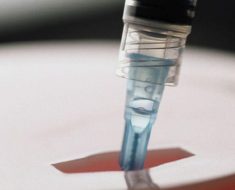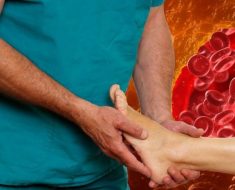There are various health benefits adequate amounts of vitamin D can provide, such as bone strength. Growing older, it’s important to maintain strong bones or else breakages can become commonplace. Could you do with a vitamin boost?
Adults under 70 years old are required to receive between 600IU to 4,000IU of vitamin D each day.
For people over the age of 70, the minimum daily vitamin dosage increases to 800IU.
These guidelines were provided by the Cleveland Clinic, who added there are various causes of a vitamin D deficiency.
Aside from getting out and about, vitamin D levels can be lowered by certain medications.
This includes laxatives, steroids (namely prednisone), and cholesterol-lowering drugs (such as cholestyramine and colestipol).
Then there are seizure-control drugs, such as phenobarbital and phenytoin, and a tuberculous drug called rifampin.
Even a weight-loss drug, known as orlistat, can lower vitamin D levels in the body.

Darker skinned individuals, as well as older people, are less able to make vitamin D from sunlight.
So, how do you know if you’re deficient in vitamin D? It may not be obvious, but there are subtle signs to be aware of.
For example, you may experience bone and joint pain – especially in your back.
Another indication of a vitamin D deficiency is the presence of muscle cramps or weakness.
Fatigue could also be a sign of the condition, as well as mood changes or bone loss.
People who become deficient in vitamin D are at risk of developing osteomalacia.
Otherwise known as “soft bones”, osteomalacia is a disease that weakens bones and causes them to break more easily.
Symptoms of this condition are pain in the bones and hips, bone fractures and muscle weakness.

If you’re concerned about your vitamin D levels, your doctor can order a relevant blood test.
Checking for vitamin D levels isn’t routine practice, so you’ll need to request it from your doctor.
The most common type of blood test ordered is the 25-hydroxyvitamin D – shortened as 25(OH)D.
There is no reason to fast, or otherwise prepare, for this quick and efficient blood test.

Should the blood test results reveal you’re deficient in vitamin D, you may be advised to take vitamin D supplements.
However, don’t jump ahead and assume you’re deficient in the vitamin and start taking supplements anyway.
This is because it is possible to have too much vitamin D in your body, which can lead to its own health problems.
For example, vitamin D toxicity can lead to hypercalcemia, which can prompt a neurological disorder called ataxia.
Source: Read Full Article





